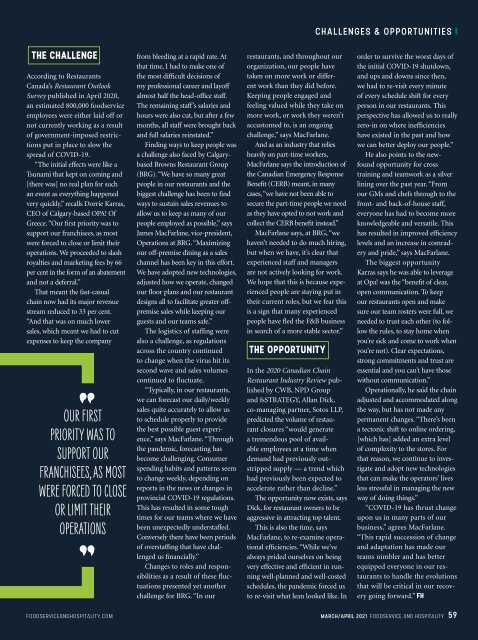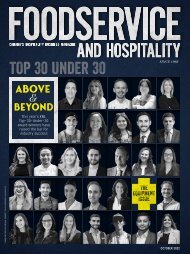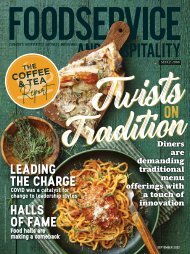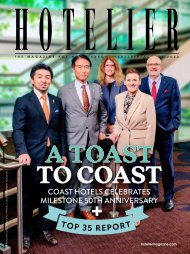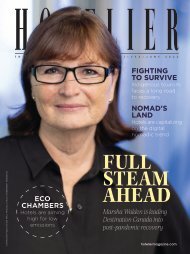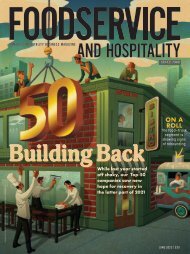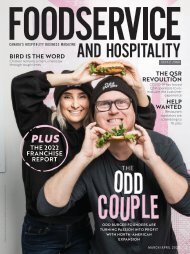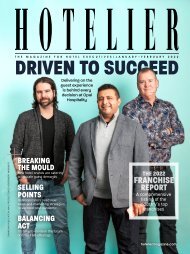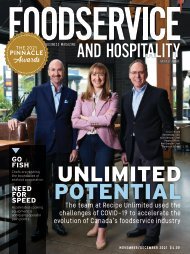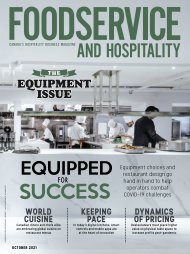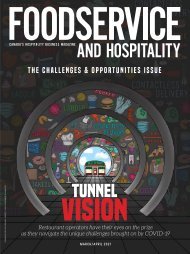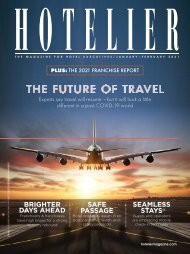March/April (Revised)
Create successful ePaper yourself
Turn your PDF publications into a flip-book with our unique Google optimized e-Paper software.
CHALLENGES & OPPORTUNITIES<br />
THE CHALLENGE<br />
According to Restaurants<br />
Canada’s Restaurant Outlook<br />
Survey published in <strong>April</strong> 2020,<br />
an estimated 800,000 foodservice<br />
employees were either laid off or<br />
not currently working as a result<br />
of government-imposed restrictions<br />
put in place to slow the<br />
spread of COVID-19.<br />
“The initial effects were like a<br />
Tsunami that kept on coming and<br />
[there was] no real plan for such<br />
an event as everything happened<br />
very quickly,” recalls Dorrie Karras,<br />
CEO of Calgary-based OPA! Of<br />
Greece. “Our first priority was to<br />
support our franchisees, as most<br />
were forced to close or limit their<br />
operations. We proceeded to slash<br />
royalties and marketing fees by 66<br />
per cent in the form of an abatement<br />
and not a deferral.”<br />
That meant the fast-casual<br />
chain now had its major revenue<br />
stream reduced to 33 per cent.<br />
“And that was on much lower<br />
sales, which meant we had to cut<br />
expenses to keep the company<br />
OUR FIRST<br />
PRIORITY WAS TO<br />
SUPPORT OUR<br />
FRANCHISEES, AS MOST<br />
WERE FORCED TO CLOSE<br />
OR LIMIT THEIR<br />
OPERATIONS<br />
from bleeding at a rapid rate. At<br />
that time, I had to make one of<br />
the most difficult decisions of<br />
my professional career and layoff<br />
almost half the head-office staff.<br />
The remaining staff’s salaries and<br />
hours were also cut, but after a few<br />
months, all staff were brought back<br />
and full salaries reinstated.”<br />
Finding ways to keep people was<br />
a challenge also faced by Calgarybased<br />
Browns Restaurant Group<br />
(BRG). “We have so many great<br />
people in our restaurants and the<br />
biggest challenge has been to find<br />
ways to sustain sales revenues to<br />
allow us to keep as many of our<br />
people employed as possible,” says<br />
James MacFarlane, vice-president,<br />
Operations at BRG. “Maximizing<br />
our off-premise dining as a sales<br />
channel has been key in this effort.<br />
We have adopted new technologies,<br />
adjusted how we operate, changed<br />
our floor plans and our restaurant<br />
designs all to facilitate greater offpremise<br />
sales while keeping our<br />
guests and our teams safe.”<br />
The logistics of staffing were<br />
also a challenge, as regulations<br />
across the country continued<br />
to change when the virus hit its<br />
second wave and sales volumes<br />
continued to fluctuate.<br />
“Typically, in our restaurants,<br />
we can forecast our daily/weekly<br />
sales quite accurately to allow us<br />
to schedule properly to provide<br />
the best possible guest experience,”<br />
says MacFarlane. “Through<br />
the pandemic, forecasting has<br />
become challenging. Consumer<br />
spending habits and patterns seem<br />
to change weekly, depending on<br />
reports in the news or changes in<br />
provincial COVID-19 regulations.<br />
This has resulted in some tough<br />
times for our teams where we have<br />
been unexpectedly understaffed.<br />
Conversely there have been periods<br />
of overstaffing that have challenged<br />
us financially.”<br />
Changes to roles and responsibilities<br />
as a result of these fluctuations<br />
presented yet another<br />
challenge for BRG. “In our<br />
restaurants, and throughout our<br />
organization, our people have<br />
taken on more work or different<br />
work than they did before.<br />
Keeping people engaged and<br />
feeling valued while they take on<br />
more work, or work they weren’t<br />
accustomed to, is an ongoing<br />
challenge,” says MacFarlane.<br />
And as an industry that relies<br />
heavily on part-time workers,<br />
MacFarlane says the introduction of<br />
the Canadian Emergency Response<br />
Benefit (CERB) meant, in many<br />
cases, “we have not been able to<br />
secure the part-time people we need<br />
as they have opted to not work and<br />
collect the CERB benefit instead.”<br />
MacFarlane says, at BRG, “we<br />
haven’t needed to do much hiring,<br />
but when we have, it’s clear that<br />
experienced staff and managers<br />
are not actively looking for work.<br />
We hope that this is because experienced<br />
people are staying put in<br />
their current roles, but we fear this<br />
is a sign that many experienced<br />
people have fled the F&B business<br />
in search of a more stable sector.”<br />
THE OPPORTUNITY<br />
In the 2020 Canadian Chain<br />
Restaurant Industry Review published<br />
by CWB, NPD Group<br />
and fsSTRATEGY, Allan Dick,<br />
co-managing partner, Sotos LLP,<br />
predicted the volume of restaurant<br />
closures “would generate<br />
a tremendous pool of available<br />
employees at a time when<br />
demand had previously outstripped<br />
supply — a trend which<br />
had previously been expected to<br />
accelerate rather than decline.”<br />
The opportunity now exists, says<br />
Dick, for restaurant owners to be<br />
aggressive in attracting top talent.<br />
This is also the time, says<br />
MacFarlane, to re-examine operational<br />
efficiencies. “While we’ve<br />
always prided ourselves on being<br />
very effective and efficient in running<br />
well-planned and well-costed<br />
schedules, the pandemic forced us<br />
to re-visit what lean looked like. In<br />
order to survive the worst days of<br />
the initial COVID-19 shutdown,<br />
and ups and downs since then,<br />
we had to re-visit every minute<br />
of every schedule shift for every<br />
person in our restaurants. This<br />
perspective has allowed us to really<br />
zero-in on where inefficiencies<br />
have existed in the past and how<br />
we can better deploy our people.”<br />
He also points to the newfound<br />
opportunity for cross<br />
training and teamwork as a silver<br />
lining over the past year. “From<br />
our GMs and chefs through to the<br />
front- and back-of-house staff,<br />
everyone has had to become more<br />
knowledgeable and versatile. This<br />
has resulted in improved efficiency<br />
levels and an increase in comradery<br />
and pride,” says MacFarlane.<br />
The biggest opportunity<br />
Karras says he was able to leverage<br />
at Opa! was the “benefit of clear,<br />
open communication. To keep<br />
our restaurants open and make<br />
sure our team rosters were full, we<br />
needed to trust each other (to follow<br />
the rules, to stay home when<br />
you’re sick and come to work when<br />
you’re not). Clear expectations,<br />
strong commitments and trust are<br />
essential and you can’t have those<br />
without communication.”<br />
Operationally, he said the chain<br />
adjusted and accommodated along<br />
the way, but has not made any<br />
permanent changes. “There’s been<br />
a tectonic shift to online ordering,<br />
[which has] added an extra level<br />
of complexity to the stores. For<br />
that reason, we continue to investigate<br />
and adopt new technologies<br />
that can make the operators’ lives<br />
less stressful in managing the new<br />
way of doing things.”<br />
“COVID-19 has thrust change<br />
upon us in many parts of our<br />
business,” agrees MacFarlane.<br />
“This rapid succession of change<br />
and adaptation has made our<br />
teams nimbler and has better<br />
equipped everyone in our restaurants<br />
to handle the evolutions<br />
that will be critical in our recovery<br />
going forward.” FH<br />
FOODSERVICEANDHOSPITALITY.COM<br />
MARCH/APRIL 2021 FOODSERVICE AND HOSPITALITY 59


